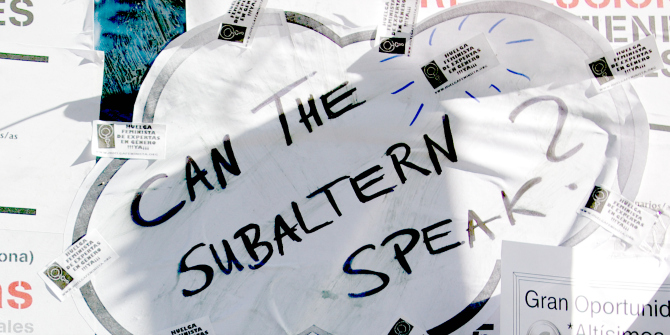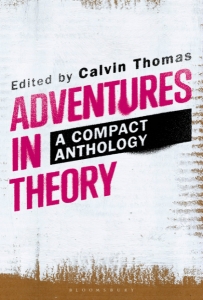In Adventures in Theory: A Compact Anthology, Calvin Thomas offers a new collection of eighteen excerpts of classic books and essays by formative thinkers including Gayatri Chakravorty Spivak, Judith Butler, Roland Barthes and Michel Foucault. Yves Laberge recommends this anthology to those looking to discover conceptual tools to better understand the ideologies, mechanisms and structures underpinning our societies.
Adventures in Theory: A Compact Anthology. Calvin Thomas (ed.). Bloomsbury. 2019.
There is nothing like practice, but academics remind us about the importance of doing theory, no matter what field one studies. One of the purposes of the university is to show students how to undertake research, but also to understand how individuals, social groups, nations and societies function and reproduce themselves — in other words, why do things never seem to change as time goes by, or, conversely, why do things seem to transform? These ‘adventures in theory’ could help undergraduates with these questions across a variety of disciplines, from cultural and gender studies to social theory, from literary criticism to political science.
Very often students and lecturers seek manuals, reference resources or textbooks that propose a critical approach to modern society; for this readership, Calvin Thomas has edited what we used to call a ‘reader’ or ‘companion’, this one titled Adventures in Theory: A Compact Anthology. Some basic concepts in the social sciences and the humanities cannot simply be defined in just three lines; they need to be located, articulated, contoured and illustrated with illuminating examples. Many textbooks can explain pedagogically these concepts to newcomers, but another strategy is to get to the main source — that is, to the foundational writings — and that is just what Adventures in Theory does. This recent anthology in social theory is certainly not the first of its kind: 11 years ago, Blackwell released the biggest reader available in its field, the unsurpassed Cultural Studies: An Anthology(Wiley-Blackwell, 2008), with 83 essays and more than 1300 pages admirably edited by Michael Ryan. Compared to this gigantic red brick, Calvin Thomas’s concise book seems much thinner, thus its subtitle: A Compact Anthology.
Adventures in Theory is a new collection of eighteen excerpts taken from classic books — or, in some cases, rare articles — penned by renowned thinkers. There include the ‘usual suspects’ recurrent for so many anthologies — Karl Marx, Friedrich Nietzsche, Ferdinand de Saussure, Roland Barthes, Michel Foucault — plus some contemporary academics such as Gayatri Chakravorty Spivak, Judith Butler, Slavoj Žižek and others.
 Image Credit: (gaelx CC BY SA 2.0)
Image Credit: (gaelx CC BY SA 2.0)
Understanding social theory basics usually requires and enables students to master some indispensable concepts and keywords in the humanities and the social sciences, such as ‘signs’, ‘power’, ‘ethnicity’, ‘ideologies’, ‘deconstruction’ and ‘postmodernism’, but also ‘gender studies’ and ‘queer theory’, which are aptly exemplified here, especially in the last four essays. Some newer concepts have been forged by French theoreticians and do not appear in most standard English dictionaries: for example, Jacques Derrida’s own concept of ‘différance’ (not to be confused with ‘différence’). Two chapters discuss and delimitate this notion which cannot be abstracted in just one paragraph: one was written by Derrida himself, while the other, authored by Barbara Johnson, is interwoven here to serve as a contextualising presentation.
But these Adventures in Theory are not just a juxtaposition of abridged academic texts; Thomas situates and contextualises each selected work in his Introduction. In the opening pages, Thomas also underscores how challenging gaining permissions and licensing can be for an editor trying to gather salient texts that can still sell on their own (9). Only Thomas’s own conception of theory’s purpose — ‘to disturb everybody’ and, elsewhere, ‘the perpetual disturbance of our all-too-human realities’ (1) — leaves this critic unsatisfied. A more elaborate, coherent definition of what theory is, and is not, would have been helpful in these opening pages, so undergraduates would understand more clearly why scholars do social theory and why it is much needed as a guide and framework for any research in the social sciences and humanities. In general, a ‘good’ definition is not the one that just synthesises a term or concept for those who have already understood it; it is rather the one that enlightens the newcomer and gives a clear, aptly delimitated picture and not just a few characteristics.
We find here excerpts from some eighteen essays, plus an Introduction and Afterword, grouped into five thematical blocks dedicated to power, signs, ideologies, ethnic and sexual identities. The selected texts are supported by Thomas’s welcome footnotes: for example, Peter Brooks’s essay on ‘Freud’s Masterplot’ (1977) begins with a useful remark about how to transpose the linguistic concepts of ‘récit’ and ‘histoire’ into ‘narrative plot’ and ‘story’, following the salient works of linguist Tzvetan Todorov derived from Russian theoreticians (191, see also 57).
Overall, the presence of French theory — that is, French theoreticians’ works as they were selected, translated and sometimes re-appropriated during the late twentieth century by Anglo-Saxon academics into something different — is obvious here (six essays of eighteen), and it is an excellent thing for English-speaking readers. Among many good surprises, it is also particularly noteworthy and refreshing to find in this handpicked selection one classic text by French philosopher Louis Althusser (1918-90) on what he coined the ‘state ideological apparatus’, an unequalled text first published as an article in a French journal from 1970 under the title ‘Idéologies et appareils idéologiques d’État’ (‘Ideology and Ideological State Apparatuses’). Even though he was a controversial and now often overlooked academic, Althusser was quite influential back in the 1960s and 1970s as a philosopher and theoretician; his strength was his ability to conceptualise and explain the main Marxian concepts such as ideology, social classes and the state. This essay clearly defines the concept of ideology and shows how it functions: a pedagogical exercise Marx himself had never undertaken. According to Althusser: ‘Ideology represents the imaginary relationship of individuals to their real conditions of existence’ (quoted in Thomas, 138). Even though it appears in a few other anthologies, this article remains a lesser-known — although essential and irreplaceable — text in political philosophy and social theory.
Thomas’s afterword, titled ‘(Still) No Kingdom of the Queer’, is a freer demonstration of how a few concepts presented in this anthology — mainly Derrida’s ‘différance’ and ‘deconstruction’ — can be repurposed to apprehend broader matters such as gender studies, queer theory and defamiliarisation (291). We also see how most of the previous excerpts can work as prerequisites for the following ones: for example, Frantz Fanon’s essay ‘The Fact of Blackness’ from 1952 paves the way for a related 1988 essay on social exclusion, ‘Can the Subaltern Speak?’ by Spivak.
Now, the final, unavoidable question: what kind of reader would need Adventures in Theory? Firstly, advanced undergraduates who aim to discover some major thinkers who have conceptualised our societies — there is nothing like reading a Marxist critique of social classes written by Marx himself. Alongside them, graduate students who need a theoretical background to support their critique of power and hegemony will find here some basic elements. And, finally, scholars from a wide variety of disciplines, from political economy to cultural studies, will get the conceptual tools they need to understand how ideologies and mechanisms such as social reproduction subtly work to reaffirm and perpetuate our capitalist, consumer-oriented and neoliberal systems. One last remark: undergraduates should not be discouraged with the first pages as we begin with some dense essays by Marx, Nietzsche and de Saussure.
Of course, one could think of an infinity of ‘missing texts’ to be added, those ‘essential thinkers’ who ‘shouldn’t have been left apart’; but a single anthology cannot gather everything, otherwise the resulting book would be so big, students would be afraid to look at it (or consider buying it). Incidentally, Thomas acknowledges his choices, omissions and his ‘logics of inclusion’ (8): he explains how these selected essays can sometimes replace others (9). And for literary critics, it would only be fair to judge and evaluate books (and anthologies) for what they are and for what they have to offer, and not for what they could have been.
Please read our comments policy before commenting.
Note: This article is provided by our sister site, LSE Review of Books. It gives the views of the author, not the position of EUROPP – European Politics and Policy or the London School of Economics.
_________________________________
Yves Laberge – University of Ottawa
Yves Laberge is a Canadian sociologist affiliated with the University of Ottawa where he teaches Social Sciences, Canadian and American Studies and Aesthetics. He is Associate fellow at the Centre de recherche en éducation et formation relatives à l’environnement et à l’écocitoyenneté – Centr’ERE, Université du Québec à Montréal (UQAM). Yves Laberge is a member of the Editorial Board for seven academic journals: The Electronic Green Journal (UCLA); The European Legacy. Toward New Paradigms; The Canadian Review of American Studies; Empedocles: European Journal for the Philosophy of Communication; New Cinemas: Journal of Contemporary Film; Journal of Religion and Popular Culture; and Intersections: Gender and Sexuality in Asia and the Pacific.


 Find this book:
Find this book: 
